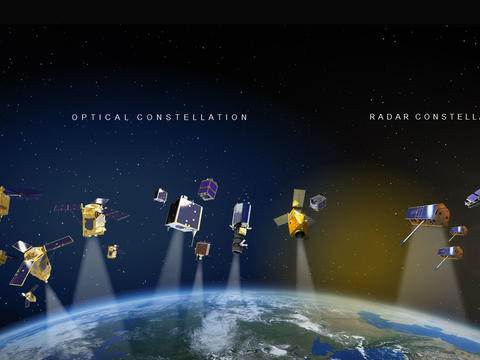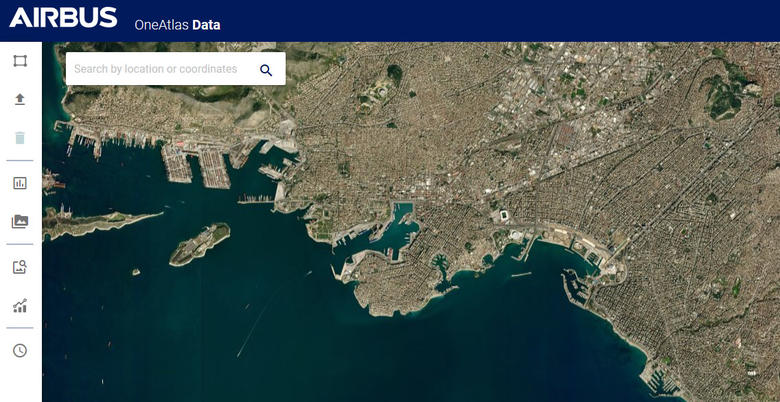What’s next in Space?
The Space industry is changing. But that’s nothing new. Space has been pushing back the realms of the possible for decades and that’s what makes it so exciting.
The industry today takes many forms. Original pioneers who have innovation coursing through their veins. Newer players taking centre stage with impressive technology and far-flung ambitions. Start-ups developing niche technologies. A supply chain focused on components that cannot fail over years, if not decades, in orbit.
All approach this in their own unique ways and all have something unique to offer.
Space matters
Airbus has always been at the forefront, a creator and a visionary, playing an essential role in the space adventure from the very beginning.
This pioneering spirit remains at our heart today to ensure we continue to produce the very best services and technologies that connect, protect, inform, explore and direct down here on Earth. And increasingly, we do this together with valued partners.
In this together
In days gone by, Space was reserved for a select few players and they achieved some amazing things, from landing on the Moon, Mars or even a comet flying at a mind boggling 37 kilometres per second to delivering the first views of Earth from space that we take for granted today.
But as space is increasingly needed in our daily lives – from helping us find our way to meet friends, to checking the weather before a weekend away, more sustainable agriculture and, thankfully less often, to support in times of crisis – we need more companies able to bring the benefits of space down to Earth.
This is why Airbus partners with hundreds of start-ups such as in our digital platforms where we make millions of images readily available so that collectively we can deliver insights from space. It’s also why we worked hard to revolutionise small satellite manufacturing enabling us to drastically reduce costs and work with new players like Loft Orbital whose ambition is to make our platform the “workhorse of their business model”.
Airbus also believes in the value of co-creation which is why we work closely with incubators and accelerators like SpaceFounders and the Starburst and why we created our very own Space Accelerator programme to give companies a boost on their journey to space.
In the same spirit, we also play an active role in the ActInSpace hackathons. ActInSpace aims to develop innovations based on space technologies that serve life on Earth. It has already led to creation of over 35 companies around the world, with over 10,000 participants over four events.
“Forget ‘New’ vs. ‘old’ space, Airbus is committed to doing the best space possible for the benefit of humanity and dares to be different when needed. That’s Next Space.”
Striving for sustainable space – together
Importantly, we do all this with sustainability at the forefront. At Airbus we believe we need to learn from what humanity has done to the oceans, and not repeat this in space. There are currently around 10,000 active satellites in orbit. This figure is set to increase exponentially. This is why we are working with players across the international community to push for responsible and sustainable use of space – as with aircraft, we need to manage space traffic, as well as the debris that’s in space.
As a satellite operator we have significant processes and procedures to monitor and manage the immediate space around our satellites to avoid any other satellites or debris getting close. Our teams monitor this daily and take appropriate action as needed.
On a technical level, we have tested three technologies in orbit to clear out space junk and avoid spacecraft collisions. We also abide by space law and industry best practices with safe removal of spacecraft at the end of their operational life.
Up in space, an example of this is the recent deorbiting of the Aeolus satellite.
There is still a huge amount of work to be done – and it’s a topic which must be tackled at an international scale – but if space becomes unusable, what next? We will all suffer.
At Airbus it isn’t a space race, it’s a human race to advance the future of humanity. It’s about seeing how far we can all go, not just how far any one individual, organisation or even country can go.
See our testimonial and innovation stories
-
 Press releases Space
Press releases SpaceAirbus announces purchase of Eutelsat OneWeb’s stake in Satellite Constellation…
Airbus completed the purchase of Eutelsat OneWeb's 50 percent share of the Airbus OneWeb Satellites (AOS) joint venture -
 News Space
News SpaceNew legs for the Moon!
-
 Press releases Space
Press releases SpaceESA entrusts Airbus further for Earth observation standard reference TRUTHS mission
-
 Press releases Space
Press releases SpaceAirbus awarded UK Space Agency grant to develop Space Catalyst in Stevenage
-
 News Space
News SpaceAirbus and SATLANTIS sign a MoU to develop infrared capability for the Spanish MoD


















